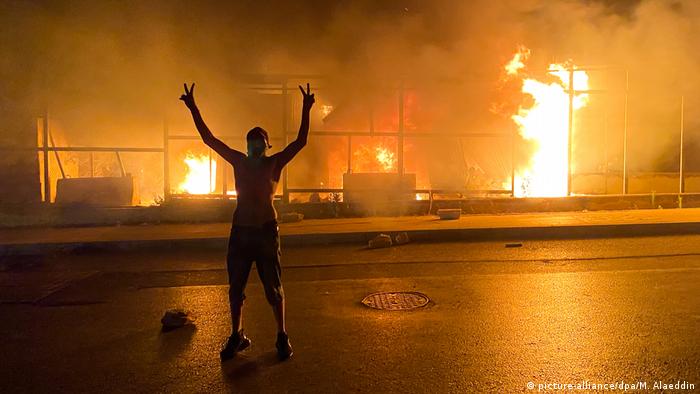Lebanon: Protesters demand new government to tackle crisis
Protesters have described a unity government aimed at shoring up the economy and tackling corruption as a "failure." With the Lebanese pound on the verge of collapse, protesters have called for a new government

Hundreds of protesters rallied in Beirut on Saturday against the government and its response to the worst economic crisis Lebanon has seen since the end of its brutal civil war in 1990.
"This current government proved to be a failure. We want a new government," said Lebanese activist Neemat Badreddin. "We want stability and we want to be able to live without begging or without people having to migrate."
Last year, former Prime Minister Saad Hariri resigned under pressure from anti-government protests against political elites, who are widely viewed as corrupt and responsible for plunging the country into its economic crisis.

Anti-government protesters in Beirut hurl rocks at Lebanese security forces during a demonstration against dire economic conditions
Converging crises
A new government led by Prime Minister Hassan Diab has failed to materialize economic progress. Even talks with the International Monetary Fund to unlock billions of dollars has failed to gain traction.
Meanwhile, the Lebanese pound has depreciated to historic levels, plunging to 6,000 Lebanese pounds to the US dollar on Friday, down from the official 1,507-pound peg put in place during the 1990s.
The depreciation has significantly increased the cost of living for those residing in Lebanon, including more than 1 million Syrian refugees. Restrictions on mobility and gatherings to curb the novel coronavirus have further dented Lebanon's aspirations for an economic recovery.
Read more: Syrian refugees in Lebanon more scared of starvation than COVID-19
'Lies and rumors'
Diab on Friday condemned rioting, accusing unnamed forces of attempting to mount a "coup" against his government.
"Some have tried to exploit the situation again," said Diab. "They have thrown lies and rumors, have contributed to deepening the Lebanese pound crisis, have caused a major crisis and have pushed people onto the streets."
The government said it would inject US dollars into the economy in a bid to prop up the Lebanese pound. But protesters largely agree that such efforts aren't enough to tackle the widening fallout of the economic crisis.
"We don't believe all the measures taken by the government to improve the dollar exchange rate," said a protester in Tripoli. "I just want a job so I can live."
ls/stb (Reuters, AP)
DW RECOMMENDS
Lebanon faces coronavirus, poverty, hunger
The Lebanese government has been able to contain the virus so far. Most of all, the strict protection measures affect people living in extreme poverty, and refugees. Their livelihoods and health are at stake. (28.04.2020)
Date 14.06.2020
Related Subjects Currency, Lebanon
Keywords Lebanon, protests, Middle East, currency, corruption
Permalink http3djfhs://p.dw.com/p/
The Lebanese government has been able to contain the virus so far. Most of all, the strict protection measures affect people living in extreme poverty, and refugees. Their livelihoods and health are at stake. (28.04.2020)
Date 14.06.2020
Related Subjects Currency, Lebanon
Keywords Lebanon, protests, Middle East, currency, corruption
Permalink http3djfhs://p.dw.com/p/
No comments:
Post a Comment